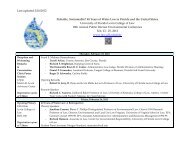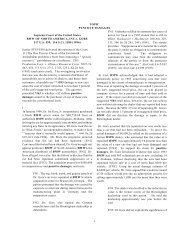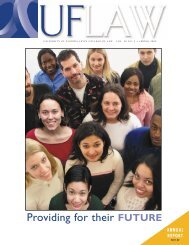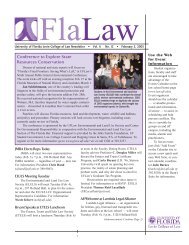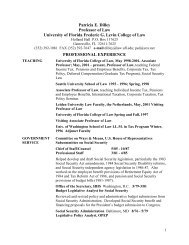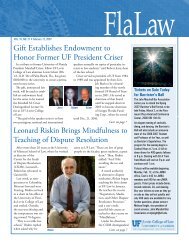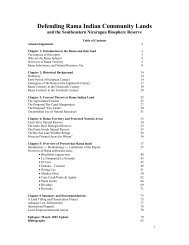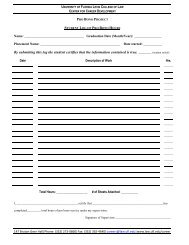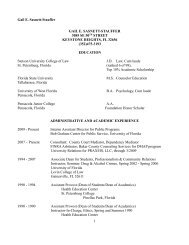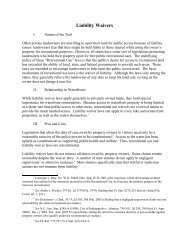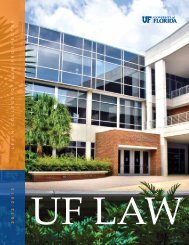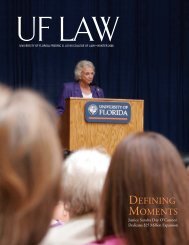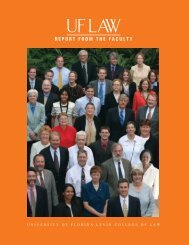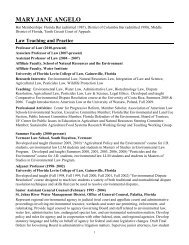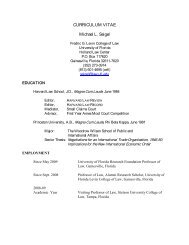states to appoint its electors before theElectoral <strong>College</strong>’s federally mandatedDec. 18 meeting.The second Gore v. Harris rulingallowed for a statewide hand recount<strong>of</strong> undervotes, but it did not include“overvotes” — votes where selectionsfor president were clearly indicated,but which also included the candidate’sname handwritten on the ballot. Neitherstate law nor the court provided uniformstandards for how to conduct the recount.Instead, each county’s canvassing boardwould use its own standards.“In the first case, the case involvingthe protest in the certification tothe secretary <strong>of</strong> state, we had beenunanimous. In the second case, wewere not,” said Wells. “I wrote in mydissent that I felt like the majority’sdecision created a basketful <strong>of</strong> practicalproblems. The statute didn’t provide anystandards for making a determination <strong>of</strong>voter intent that, at that point, our courtwas requiring to be done statewide.Again, those questions seem to me tohave been a difficulty <strong>of</strong> the electionsstatutes, which really just didn’t addressthem.”“The [<strong>Florida</strong>] election laws really werenot designed in such a way that fit apresidential election where the margin <strong>of</strong>victory was within the margin <strong>of</strong> error.”<strong>Florida</strong> Supreme Court JusticeCharles T. Wells (JD 64) speaksto a classroom <strong>of</strong> UF <strong>Law</strong>students regarding pr<strong>of</strong>essionalresponsibility during his Sept. 26visit to UF <strong>Law</strong> sponsored by theAmerican Constitution Society.SUPREMELY CONTROVERSIALBush asked the U.S. Supreme Court tointervene, which it did on Dec. 9 whenit issued a writ <strong>of</strong> certiorari for Bush v.Gore and enjoined <strong>Florida</strong>’s recount.“In the case <strong>of</strong> the second lawsuit,there were a couple <strong>of</strong> federal questionsinvolved,” said Clifford Jones, associatein law and lecturer at the <strong>University</strong> <strong>of</strong><strong>Florida</strong> <strong>Levin</strong> <strong>College</strong> <strong>of</strong> <strong>Law</strong>’s Centerfor Governmental Responsibility. “One<strong>of</strong> them had to do with whether or not theprocess <strong>of</strong> counting votes and recountingvotes satisfied the constitutionalprotections <strong>of</strong> equal protection and dueprocess. A secondary issue, which wasrelated to the first appeal, was whetheror not what the <strong>Florida</strong> court did wasinterfering with the constitutionaldirection that the electors for president beselected by direction <strong>of</strong> the Legislature asopposed to by direction <strong>of</strong> the courts.”The court issued a per curiam opinionthat the <strong>Florida</strong> court ruling was inviolation <strong>of</strong> the Equal Protection Clause<strong>of</strong> the 14th Amendment because therewas no standard by which all 67 countiescould conduct the ballot recount. Theopinion stated that it applied only tothe specific circumstances <strong>of</strong> Bush v.Gore, and should not be consideredprecedential because “the problem <strong>of</strong>equal protection in election processesgenerally presents many complexities.”In addition, a majority <strong>of</strong> the court agreedthat no constitutionally valid recountcould be conducted in time to meet thefederal safe haven deadline <strong>of</strong> Dec. 12.The court was divided as to whetherthe <strong>Florida</strong> Supreme Court’s statutoryconstruction to allow a recount after thestate’s Nov. 14 certification deadline wasin violation <strong>of</strong> Article II.“Frankly, the most controversialaspect <strong>of</strong> the Supreme Court’s decisionwas to stop the recount, as opposedto merely remanding it for furtherproceedings in the court below,” saidJones. “I think the court did that becausethey considered that the <strong>Florida</strong> SupremeCourt had indicated intent to rely onthe safe harbor provision <strong>of</strong> the federalstatute.”The Supreme Court issued its opinionson Dec. 12. The controversial decisionleft Gore little time for further action andhe soon conceded the election.Legal scholar Cass Sunstein laterwrote, “For those who believe in the rule<strong>of</strong> law, it is more than disturbing to findthat by far the best predictor <strong>of</strong> one’s attitudetoward Bush v. Gore is whetherone voted for Bush or for Gore. … it isextremely disturbing to find that on thehighly technical, even esoteric issuesinvolved in the case, the attitudes <strong>of</strong> somany specialists — including journalistswho follow the court, political scientists,historians, law pr<strong>of</strong>essors and even judges— seem determined, almost all <strong>of</strong> thetime, by their political preferences.”Nonetheless, Americans, despitetheir political preferences, accepted the18 UF LAW
high court’s decision as final and got onwith business as usual.“Everyone believed this wouldresolve itself and a lot <strong>of</strong> people believed,at the end <strong>of</strong> the day, the Electoral <strong>College</strong>would step in as it is designed to do ifnecessary,” said Zack. “I’ve recentlyspoken at law schools in China, Russiaand Poland, and this was a commonquestion. My unequivocal answer wasthat we as a people are fully committedto the constitutional electoral processand, at all times, were going to turn toour lawyers and not to our generals.”That reliance on the law hasn’tsquelched cynical speculation by somethat partisan fervor motivated decisionsmade by both the <strong>Florida</strong> Supreme Courtand the U.S. Supreme Court. Yet the truth<strong>of</strong> the matter may have been in plain sightall along.“The [<strong>Florida</strong>] election laws reallywere not designed in such a way thatfit a presidential election where themargin <strong>of</strong> victory was within the margin<strong>of</strong> error. The courts were trying todeal in a very short time span with theproverbial square peg in a round hole.It just was not something that could bedealt with in a very satisfactory way,”said Wells. “What I have said, and whatI truly believe, is this was the election<strong>of</strong> the president <strong>of</strong> the United States,and no matter what the legal avenues orapproaches were for the United StatesSupreme Court to get to it, it still wasnecessary for the United States SupremeCourt to have the final say.”ELECTION REFORM, FLORIDA-STYLE<strong>Florida</strong> is no stranger to presidentialelection problems. Few are aware thatthe congressional Electoral Count Act<strong>of</strong> 1877 — which, ironically, establishedthe Dec. 12 safe haven deadline drivinglitigation in <strong>Florida</strong>’s 2000 presidentialelection — was enacted in part as a result<strong>of</strong> <strong>Florida</strong>’s disputed 1876 presidentialelection between Rutherford B. Hayesand Samuel J. Tilden. The scandal <strong>of</strong>that election involved alleged ballot boxstuffing and suppression <strong>of</strong> Republicanvoters, mostly freed slaves.With <strong>Florida</strong>’s 27 electoral votes upfor grabs and tight margins reported inadvance <strong>of</strong> the 2008 election betweenAP PHOTO/PETE COSGROVEMillsStanding on the <strong>Florida</strong>Supreme Court steps,spokesman Craig Waters (JD86), announces the court’s7-0 ruling in Tallahassee, Fla.,Nov. 21, 2000 that amendedvote tallies must be acceptedin the state’s contestedpresidential election.John McCain and Barack Obama, manyworried the state could again experiencechaos. This election went smoothly,for the most part, despite heavy voterturnout — 73 percent <strong>of</strong> the state’sregistered voters, nearly 8.2 millionFloridians, voted (4.3 million <strong>of</strong> thoseduring early voting).“Since 2000, there have been aseries <strong>of</strong> statutory responses thatwould make [a recount] muchmore streamlined, standardizedand easier to conduct.”“The 2000 situation was unique inhistory,” said Jon Mills, a UF pr<strong>of</strong>essor<strong>of</strong> law, dean emeritus, and director <strong>of</strong>the <strong>Levin</strong> <strong>College</strong> <strong>of</strong> <strong>Law</strong> Center forGovernmental Responsibility (whichsponsored a post-election conference atthe <strong>Levin</strong> <strong>College</strong> <strong>of</strong> <strong>Law</strong> featuring theprincipals <strong>of</strong> the court cases, includingFALL 2008 19
- Page 1 and 2: UF LAWUNIVERSITY OF FLORIDA FREDRIC
- Page 3 and 4: UF LAW Vol. 45, Issue 1 FALL 2008CO
- Page 5 and 6: “We openedin 1909 with 38students
- Page 7 and 8: question, but it was probably theon
- Page 9 and 10: UF Conservation ClinicTeams Up With
- Page 11 and 12: “I feel very strongly that casewa
- Page 13 and 14: Fifty years ago one man changed the
- Page 15 and 16: Early newspaperaccounts of George H
- Page 17 and 18: “The first lesson is this: Take i
- Page 19: I should certify in time according
- Page 23 and 24: AP PHOTO/J.PAT CARTEREarly voters c
- Page 25 and 26: tender age of 18, where he became a
- Page 27 and 28: Allen, left, and Andrew Hallreturne
- Page 29 and 30: In the old Alligator Alley, AndyOwe
- Page 31 and 32: Brenda Owens-Philhower with herdaug
- Page 33 and 34: DAVID GRUNFELD/THE TIMES-PICAYUNEPe
- Page 35 and 36: Homes in the Pontchartrain Parkneig
- Page 37 and 38: PART I:Making the case forelectroni
- Page 39 and 40: PART II:Discoveringe-discoveryBY IA
- Page 41 and 42: which could force delays throughout
- Page 43 and 44: some big problems with the juvenile
- Page 45 and 46: Florida TomorrowThe Campaign for th
- Page 47 and 48: CLASS NOTESShare your newsThe e-mai
- Page 49 and 50: The magic touchDerek Bruce (JD/MBA
- Page 51 and 52: COURTROOM SKETCH COURTESY OF DANA V
- Page 53 and 54: Making the cut Scott Sheftall (JD 7
- Page 55 and 56: A man of firstsAlfredo Garcia (JD 8
- Page 57 and 58: Pro bono pays offJason Lazarus (JD
- Page 59 and 60: Golden opportunityEvelyn Davis Gold
- Page 62 and 63: As chair of the Law CenterAssociati
- Page 64 and 65: Financial SummaryOF GIVING JULY 1,
- Page 66 and 67: I loved my time at UF as an undergr
- Page 68 and 69: John M. GilliesDaniel J. GlassmanMa
- Page 70 and 71:
While on our life’s journey, we m
- Page 72 and 73:
Gary L. & Suzanne Printy*J. Stephen
- Page 74 and 75:
Greg & Sonya BrownJoshua R. & Monic
- Page 76 and 77:
Ross T. & Silvana LessackChauncey W
- Page 78 and 79:
As a May 2006 graduate, I spent hal
- Page 81 and 82:
M. Stephen Smith IIIRodney W. Smith
- Page 83 and 84:
Douglas A. SmithH. Bradley StaggsGe
- Page 85 and 86:
Enrichment SocietySara S. BeckerJoh
- Page 87 and 88:
PartnersDavid H. PeekJohn J. Scrogg
- Page 89 and 90:
NOTAS BENEFaculty Scholarship & Act
- Page 91 and 92:
NOTAS BENEAlyson FlournoyUF Researc
- Page 93 and 94:
NOTAS BENE■ Presented “When the
- Page 95 and 96:
NOTAS BENE■ Participated in “Ne
- Page 97 and 98:
NOTAS BENEroundtable, Northwestern
- Page 99 and 100:
UP AND COMINGUF Law Student Wins Di



